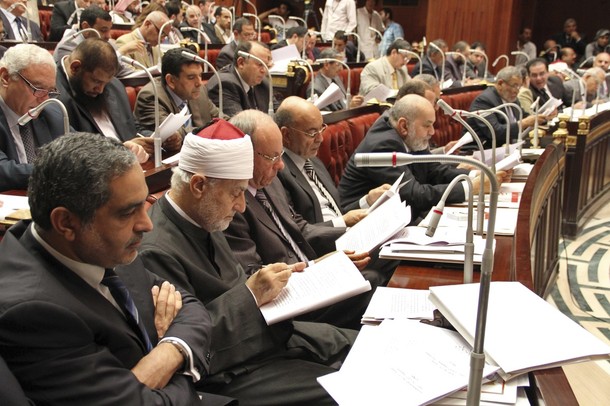
The rapporteur for the Defense and National Security Committee, a subcommittee of the Committee on the System of Government in the Constituent Assembly, Dr. Mohammed Mohieddin, said that “[the Committee] completed the final draft for the articles pertaining to defense and national security. The Committee on the System of Government approved the final draft after the completion of the initial draft of the articles pertaining to executive power and the House of Representatives. Only the articles pertaining to the Senate, the judiciary, and local administration remain, which will likely be completed in a week or two at most.”
The final draft of the articles on Defense and National Security in its last meeting, obtained by al-Shorouk, read as follows:
Article (1):
[Placed in the section on the president in the Executive Authority chapter] The President is the Commander-in-Chief of the Armed Forces, and declares war after taking the opinion of the National Defense Council and the approval of the House of Representatives. He is prohibited from sending armed forces outside the country except by following the same procedures, by specific rules and regulations.
Article (2):
The Armed Forces belongs to the people, and its task is to protect the country and preserve its security and territorial integrity. The State alone may establish the Armed Forces, and prohibits any body, or entity, or group from establishing formations, militias, teams, military or paramilitary organizations. The law shall clarify the terms of service and promotion in the Armed Forces. The Armed Forces shall have a Supreme Council in a manner prescribed by law.
Article (3):
The Defense Minister is the General Commander of the Armed Forces, and is appointed from among its officers.
Article (4):
Defense of the nation and protecting its land is an honor and a sacred duty, and conscription is compulsory in accordance with the law. The law shall regulate the public mobilization.
Article (5):
In the event of unrest within the country, and after taking the opinion of the National Defense Council, the President may issue a decree allowing the Armed Forces to participate in maintaining security, order, and the protection of vital installations in the country. This shall be regulated by law.
[With regard to Article 5, the Committee unanimously agreed that if the majority of the members of the Assembly voted to remove this article, an explanatory memorandum should recommend that the article be included in the law.]
Article (6):
A Council called the National Defense Council shall be formed, and the President of the Republic will be its president.
Its membership shall include both heads of the House and the Senate chambers of Parliament, the Prime Minister, and the Ministers of Defense, Foreign Affairs, Finance, and Interior, the head of the General Intelligence Service, the Chief of Staff of the Armed Forces, the commanders of the Navy, Air Force, and Air Defense, Chief of Operations for the Armed Forces, and the Director of Military Intelligence and Reconnaissance.
The Council shall consider affairs pertaining to the means of securing the country and its safety, to discuss the budget of the Armed Forces to be included as a single figure in the state budget, and its opinion must be considered on draft laws relating to the Armed Forces before being presented to the legislature. The law shall also clarify its other domains, and the president may invite those he deems qualified and experienced to attend meetings of the Council.
Section V – The Police:
Article (7):
The Police is an organized civil body, its loyalty to the people, the constitution, and the law, and performs its duty in the service of the people.
[The police] shall guarantee citizens trust, security, and the protection of their rights, dignity, and fundamental freedoms, and ensure the maintenance of security and public order and morals, and shall implement that which is imposed by law.
All regulations that ensure the performance of the members of the police of their duties, shall be provided in a manner prescribed by the law.
Source: al-Shorouk
Image: 610x_97.jpg
